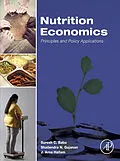Nutrition Economics: Principles and Policy Applications establishes the core criteria for consideration as new policies and regulations are developed, including application-based principles that ensure practical, effective implementation of policy. From the economic contribution of nutrition on quality of life, to the costs of malnutrition on society from both an individual and governmental level, this book guides the reader through the factors that can determine the success or failure of a nutrition policy. Written by an expert in policy development, and incorporating an encompassing view of the factors that impact nutrition from an economic standpoint (and their resulting effects), this book is unique in its focus on guiding other professionals and those in advanced stages of study to important considerations for correct policy modeling and evaluation. As creating policy without a comprehensive understanding of the relevant contributing factors that lead to failure is not an option, this book provides a timely reference. - Connects the direct and indirect impacts of economic policy on nutritional status - Provides practical insights into the analysis of nutrition policies and programs that will produce meaningful results - Presents a hands-on approach on how to apply economic theory to the design of nutritional policies and programs
Autorentext
Suresh C Babu is a Senior Research Fellow and Head of Capacity Strengthening at the International Food Policy Research Institute (IFPRI), Washington D.C. Before joining IFPRI in 1992 as a Research Fellow, Dr. Babu was a Research Economist at the Division of Nutritional Sciences, Cornell University, Ithaca, New York. Between 1989 and 1994 he spent 5 years in Malawi, Southern Africa on various capacities. He was Senior Food Policy Advisor to the Malawi Ministry of Agriculture on developing a national level Food and Nutrition Information System; an Evaluation Economist for the UNICEF-Malawi working on designing food and nutrition intervention programs; Coordinator of UNICEF/IFPRI food security program in Malawi; and a Senior Lecturer at the Bunda College of Agriculture, Lilongwe University of Agriculture and Natural Resources (LUANR). He has been coordinator of IFPRI's South Asia Initiative and Central Asia Program. His past research covers a range of developmental issues including nutrition economics and policy, economics of soil fertility, famine prevention, market integration, migration, pesticide pollution, groundwater depletion, and gender bias in development. He has published more than 18 books and monographs and 80 peer reviewed journal papers. He has been on the advisory board of World Agricultural Forum and a Coordinating Lead Author of Millennium Ecosystem Assessment. He currently conducts research on Capacity Development including Economic Analysis of Extension and Advisory Services; Reforming of National agricultural Research Systems; Understanding Policy Process; and Institutional Innovations for Agricultural Transformation. He is or has been a Visiting as Honorary Professor of Indira Gandhi National Open University, India, American University, Washington DC, University of Kwazulu-Natal, South Africa, and Zhejiang University, China. He currently serves or has served on the editorial boards of the following journals - Food Security, Food and Nutrition Bulletin, Agricultural Economics Research Review, African Journal of Agricultural and Resource Economics, African Journal of Management, and African Journal of Food, Nutrition, and Development. Dr. Babu was educated at Agricultural Universities in Tamil Nadu, India (B.S. Agriculture; M.S. Agriculture) and at Iowa State University, Ames, Iowa (M.S. Economics and PhD Economics).
Klappentext
Nutrition Economics: Principles and Policy Applications establishes the core criteria for consideration as new policies and regulations are developed, including application-based principles that ensure practical, effective implementation of policy. From the economic contribution of nutrition on quality of life, to the costs of malnutrition on society from both an individual and governmental level, this book guides the reader through the factors that can determine the success or failure of a nutrition policy.
Written by an expert in policy development, and incorporating an encompassing view of the factors that impact nutrition from an economic standpoint (and their resulting effects), this book is unique in its focus on guiding other professionals and those in advanced stages of study to important considerations for correct policy modeling and evaluation.
As creating policy without a comprehensive understanding of the relevant contributing factors that lead to failure is not an option, this book provides a timely reference.
- Connects the direct and indirect impacts of economic policy on nutritional status
- Provides practical insights into the analysis of nutrition policies and programs that will produce meaningful results
- Presents a hands-on approach on how to apply economic theory to the design of nutritional policies and programs
Inhalt
Part A: Introduction 1. Why Study the Economics of Nutrition? 2. Global Nutritional Challenges and Targets: A Development and Policy Perspective 3. A Conceptual Framework for Investing in Nutrition: Issues, Challenges, and Analytical Approaches
Part B: Economic Analysis of Nutrition 4. Microeconomic Nutrition Policy 5. Macroeconomic Aspects of Nutrition Policy
Part C: Economics of Nutrient Demand 6. Consumer Theory and Estimation of Demand for Food 7. Demand for Nutrients and Policy Implications
Part D: Determinants of Nutritional Status and Causal Analysis 8. Socio Economic Determinants of Nutrition: Application of Quantile Regression 9. Intra-Household Allocation and Gender Bias in Nutrition: Application of Heckman Two-Step Procedure 10. Economics of Child Care, Water, Sanitation, Hygiene, and Health: The Application of the Blinder-Oaxaca Decomposition Method
Part E: Program Evaluation and Analysis of Nutrition Policies 11. Methods of Program Evaluation: An Analytical Review and Implementation Strategies 12. Nutritional Implications of Social Protection: Application of Panel Data Method 13. Economics of School Nutrition: An Application of Regression Discontinuity
Part F: Economics of Triple Burden: Under-Nutrition, Over-Nutrition, Micronutrient Deficiencies 14. Economic Analysis of Obesity and Impact on Quality of Life: Application of NonParametric Methods
Part G: Special Topics in Nutrition Policy 15. Agriculture, Nutrition, Health: How to Bring Multiple Sectors to Work on Nutritional Goals 16. Designing a Decentralized Food System to Meet Nutrition Needs: An Optimization Approach
Part H: Conclusion 17. Future Directions for Nutrition Policy Making and Implementation
